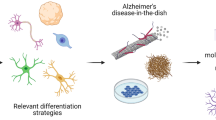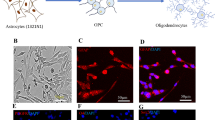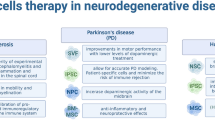Abstract
Alzheimer’s disease (AD) is a common neurodegenerative disease that contributes to 60–70% of dementia in elderly people and is currently incurable. Current treatments only relieve the symptoms of AD and slow its progression. Achieving effective neural regeneration to ameliorate cognitive impairment is a major challenge in the treatment of AD. For the first time, we alleviated symptoms of AD in APPswe/PS1dE9 mice (hereafter referred to as AD mice) by transplantation of olfactory mucosa mesenchymal stem cells (OM-MSCs). Our study demonstrated that OM-MSC transplantation promotes amyloid-β (Aβ) clearance, downregulates the inflammatory response, and increases the M2/M1 ratio; OM-MSCs promote the conversion of BV2 (microglia) from M1 to M2 and also Aβ clearance in SH-SY5YAPPswe (AD cell model). OM-MSC-transplanted AD mice show improved cognitive learning and locomotive behavior. Our study suggests that OM-MSC transplantation could alleviate the symptoms of AD and promote Aβ clearance through immunomodulation, thus demonstrating the great potential and social value of OM-MSC treatment for AD patients.






Similar content being viewed by others
Data Availability
All data are available from the corresponding author upon reasonable request.
References
Livingston G, Huntley J, Sommerlad A, Ames D, Ballard C, Banerjee S, Brayne C, Burns A et al (2020) Dementia prevention, intervention, and care: 2020 report of the Lancet Commission. Lancet (London, England) 396(10248):413–446. https://doi.org/10.1016/S0140-6736(20)30367-6
Ljubic B, Roychoudhury S, Cao XH, Pavlovski M, Obradovic S, Nair R, Glass L, Obradovic Z (2020) Influence of medical domain knowledge on deep learning for Alzheimer’s disease prediction. Comput Methods Programs Biomed 197:105765. https://doi.org/10.1016/j.cmpb.2020.105765
De-Paula VJ, Radanovic M, Diniz BS, Forlenza OV (2012) Alzheimer’s disease. Subcell Biochem 65:329–352. https://doi.org/10.1007/978-94-007-5416-4_14
Breijyeh Z, Karaman R (2020) Comprehensive review on Alzheimer’s disease: causes and treatment. Molecules 25(24). https://doi.org/10.3390/molecules25245789
Hampel H, Vassar R, De Strooper B, Hardy J, Willem M, Singh N, Zhou J, Yan R et al (2021) The beta-secretase BACE1 in Alzheimer’s disease. Biol Psychiatry 89(8):745–756. https://doi.org/10.1016/j.biopsych.2020.02.001
Alexander GC, Knopman DS, Emerson SS, Ovbiagele B, Kryscio RJ, Perlmutter JS, Kesselheim AS (2021) Revisiting FDA approval of aducanumab. N Engl J Med 385(9):769–771. https://doi.org/10.1056/NEJMp2110468
Rabinovici GD (2021) Controversy and progress in Alzheimer’s disease - FDA approval of aducanumab. N Engl J Med 385(9):771–774. https://doi.org/10.1056/NEJMp2111320
Yiannopoulou KG, Papageorgiou SG (2020) Current and future treatments in Alzheimer disease: an update. J Cent Nerv Syst Dis 12:1179573520907397. https://doi.org/10.1177/1179573520907397
Hassanzadeh A, Rahman HS, Markov A, Endjun JJ, Zekiy AO, Chartrand MS, Beheshtkhoo N, Kouhbanani MAJ et al (2021) Mesenchymal stem/stromal cell-derived exosomes in regenerative medicine and cancer; overview of development, challenges, and opportunities. Stem Cell Res Ther 12(1):297. https://doi.org/10.1186/s13287-021-02378-7
Moghadasi S, Elveny M, Rahman HS, Suksatan W, Jalil AT, Abdelbasset WK, Yumashev AV, Shariatzadeh S et al (2021) A paradigm shift in cell-free approach: the emerging role of MSCs-derived exosomes in regenerative medicine. J Transl Med 19(1):302. https://doi.org/10.1186/s12967-021-02980-6
Xie Q, Liu R, Jiang J, Peng J, Yang C, Zhang W, Wang S, Song J (2020) What is the impact of human umbilical cord mesenchymal stem cell transplantation on clinical treatment? Stem Cell Res Ther 11(1):519. https://doi.org/10.1186/s13287-020-02011-z
Park BW, Jung SH, Das S, Lee SM, Park JH, Kim H, Hwang JW, Lee S et al (2020) In vivo priming of human mesenchymal stem cells with hepatocyte growth factor-engineered mesenchymal stem cells promotes therapeutic potential for cardiac repair. Sci Adv 6(13):eaay6994. https://doi.org/10.1126/sciadv.aay6994
Staff NP, Jones DT, Singer W (2019) Mesenchymal stromal cell therapies for neurodegenerative diseases. Mayo Clin Proc 94(5):892–905. https://doi.org/10.1016/j.mayocp.2019.01.001
Teixeira FG, Carvalho MM, Panchalingam KM, Rodrigues AJ, Mendes-Pinheiro B, Anjo S, Manadas B, Behie LA et al (2017) Impact of the secretome of human mesenchymal stem cells on brain structure and animal behavior in a rat model of Parkinson’s disease. Stem Cells Transl Med 6(2):634–646. https://doi.org/10.5966/sctm.2016-0071
Guo M, Yin Z, Chen F, Lei P (2020) Mesenchymal stem cell-derived exosome: a promising alternative in the therapy of Alzheimer’s disease. Alzheimers Res Ther 12(1):109. https://doi.org/10.1186/s13195-020-00670-x
Cui GH, Wu J, Mou FF, Xie WH, Wang FB, Wang QL, Fang J, Xu YW et al (2018) Exosomes derived from hypoxia-preconditioned mesenchymal stromal cells ameliorate cognitive decline by rescuing synaptic dysfunction and regulating inflammatory responses in APP/PS1 mice. FASEB J 32(2):654–668. https://doi.org/10.1096/fj.201700600R
Losurdo M, Pedrazzoli M, D’Agostino C, Elia CA, Massenzio F, Lonati E, Mauri M, Rizzi L et al (2020) Intranasal delivery of mesenchymal stem cell-derived extracellular vesicles exerts immunomodulatory and neuroprotective effects in a 3xTg model of Alzheimer’s disease. Stem Cells Transl Med 9(9):1068–1084. https://doi.org/10.1002/sctm.19-0327
Cone AS, Yuan X, Sun L, Duke LC, Vreones MP, Carrier AN, Kenyon SM, Carver SR et al (2021) Mesenchymal stem cell-derived extracellular vesicles ameliorate Alzheimer’s disease-like phenotypes in a preclinical mouse model. Theranostics 11(17):8129–8142. https://doi.org/10.7150/thno.62069
Delorme B, Nivet E, Gaillard J, Haupl T, Ringe J, Deveze A, Magnan J, Sohier J et al (2010) The human nose harbors a niche of olfactory ectomesenchymal stem cells displaying neurogenic and osteogenic properties. Stem Cells Dev 19(6):853–866. https://doi.org/10.1089/scd.2009.0267
Alvites RD, Branquinho MV, Caseiro AR, Amorim I, Santos Pedrosa S, Rema A, Faria F, Porto B et al (2020) Rat olfactory mucosa mesenchymal stem/stromal cells (OM-MSCs): a characterization study. Int J Cell Biol 2020:2938258. https://doi.org/10.1155/2020/2938258
Ge L, Jiang M, Duan D, Wang Z, Qi L, Teng X, Zhao Z, Wang L et al (2016) Secretome of olfactory mucosa mesenchymal stem cell, a multiple potential stem cell. Stem Cells Int 2016:1243659. https://doi.org/10.1155/2016/1243659
Girard SD, Deveze A, Nivet E, Gepner B, Roman FS, Feron F (2011) Isolating nasal olfactory stem cells from rodents or humans. J Vis Exp (54). https://doi.org/10.3791/2762
Veron AD, Bienboire-Frosini C, Girard SD, Sadelli K, Stamegna JC, Khrestchatisky M, Alexis J, Pageat P et al (2018) Syngeneic transplantation of olfactory ectomesenchymal stem cells restores learning and memory abilities in a rat model of global cerebral ischemia. Stem Cells Int 2018:2683969. https://doi.org/10.1155/2018/2683969
Alvites RD, Branquinho MV, Sousa AC, Amorim I, Magalhaes R, Joao F, Almeida D, Amado S et al (2021) Combined use of chitosan and olfactory mucosa mesenchymal stem/stromal cells to promote peripheral nerve regeneration in vivo. Stem Cells Int 2021:6613029. https://doi.org/10.1155/2021/6613029
Lindsay SL, Toft A, Griffin J, Emraja AMM, Barnett SC, Riddell JS (2017) Human olfactory mesenchymal stromal cell transplants promote remyelination and earlier improvement in gait co-ordination after spinal cord injury. Glia 65(4):639–656. https://doi.org/10.1002/glia.23117
Young E, Westerberg B, Yanai A, Gregory-Evans K (2018) The olfactory mucosa: a potential source of stem cells for hearing regeneration. Regen Med 13(5):581–593. https://doi.org/10.2217/rme-2018-0009
Qin C, Lu Y, Wang K, Bai L, Shi G, Huang Y, Li Y (2020) Transplantation of bone marrow mesenchymal stem cells improves cognitive deficits and alleviates neuropathology in animal models of Alzheimer’s disease: a meta-analytic review on potential mechanisms. Transl Neurodegener 9(1):20. https://doi.org/10.1186/s40035-020-00199-x
Naaldijk Y, Jager C, Fabian C, Leovsky C, Bluher A, Rudolph L, Hinze A, Stolzing A (2017) Effect of systemic transplantation of bone marrow-derived mesenchymal stem cells on neuropathology markers in APP/PS1 Alzheimer mice. Neuropathol Appl Neurobiol 43(4):299–314. https://doi.org/10.1111/nan.12319
Ma T, Gong K, Ao Q, Yan Y, Song B, Huang H, Zhang X, Gong Y (2013) Intracerebral transplantation of adipose-derived mesenchymal stem cells alternatively activates microglia and ameliorates neuropathological deficits in Alzheimer’s disease mice. Cell Transplant 22(Suppl 1):S113-126. https://doi.org/10.3727/096368913X672181
Lee JK, Jin HK, Endo S, Schuchman EH, Carter JE, Bae JS (2010) Intracerebral transplantation of bone marrow-derived mesenchymal stem cells reduces amyloid-beta deposition and rescues memory deficits in Alzheimer’s disease mice by modulation of immune responses. Stem Cells 28(2):329–343. https://doi.org/10.1002/stem.277
Nakano M, Kubota K, Kobayashi E, Chikenji TS, Saito Y, Konari N, Fujimiya M (2020) Bone marrow-derived mesenchymal stem cells improve cognitive impairment in an Alzheimer’s disease model by increasing the expression of microRNA-146a in hippocampus. Sci Rep 10(1):10772. https://doi.org/10.1038/s41598-020-67460-1
Nivet E, Vignes M, Girard SD, Pierrisnard C, Baril N, Deveze A, Magnan J, Lante F et al (2011) Engraftment of human nasal olfactory stem cells restores neuroplasticity in mice with hippocampal lesions. J Clin Invest 121(7):2808–2820. https://doi.org/10.1172/JCI44489
Gangadaran P, Rajendran RL, Lee HW, Kalimuthu S, Hong CM, Jeong SY, Lee SW, Lee J et al (2017) Extracellular vesicles from mesenchymal stem cells activates VEGF receptors and accelerates recovery of hindlimb ischemia. J Control Release 264:112–126. https://doi.org/10.1016/j.jconrel.2017.08.022
Oh SH, Kim HN, Park HJ, Shin JY, Lee PH (2015) Mesenchymal stem cells increase hippocampal neurogenesis and neuronal differentiation by enhancing the Wnt signaling pathway in an Alzheimer’s disease model. Cell Transplant 24(6):1097–1109. https://doi.org/10.3727/096368914X679237
Hu W, Feng Z, Xu J, Jiang Z, Feng M (2019) Brain-derived neurotrophic factor modified human umbilical cord mesenchymal stem cells-derived cholinergic-like neurons improve spatial learning and memory ability in Alzheimer’s disease rats. Brain Res 1710:61–73. https://doi.org/10.1016/j.brainres.2018.12.034
Kim J, Lee Y, Lee S, Kim K, Song M, Lee J (2020) Mesenchymal stem cell therapy and Alzheimer’s disease: current status and future perspectives. J Alzheimers Dis 77(1):1–14. https://doi.org/10.3233/JAD-200219
Vagnucci AH Jr, Li WW (2003) Alzheimer’s disease and angiogenesis. Lancet 361(9357):605–608. https://doi.org/10.1016/S0140-6736(03)12521-4
Hao P, Liang Z, Piao H, Ji X, Wang Y, Liu Y, Liu R, Liu J (2014) Conditioned medium of human adipose-derived mesenchymal stem cells mediates protection in neurons following glutamate excitotoxicity by regulating energy metabolism and GAP-43 expression. Metab Brain Dis 29(1):193–205. https://doi.org/10.1007/s11011-014-9490-y
Liu Z, Li H, Hong C, Chen M, Yue T, Chen C, Wang Z, You Q et al (2018) ALS-associated E478G mutation in human OPTN (optineurin) promotes inflammation and induces neuronal cell death. Front Immunol 9:2647. https://doi.org/10.3389/fimmu.2018.02647
Jiang YL, Wang ZX, Liu XX, Wan MD, Liu YW, Jiao B, Liao XX, Luo ZW et al (2022) The protective effects of osteocyte-derived extracellular vesicles against Alzheimer’s disease diminished with aging. Adv Sci (Weinh) 9(17):e2105316. https://doi.org/10.1002/advs.202105316
Vorhees CV, Williams MT (2006) Morris water maze: procedures for assessing spatial and related forms of learning and memory. Nat Protoc 1(2):848–858. https://doi.org/10.1038/nprot.2006.116
Pitsikas N (2007) Effects of scopolamine and L-NAME on rats’ performance in the object location test. Behav Brain Res 179(2):294–298. https://doi.org/10.1016/j.bbr.2007.02.038
Funding
This work was supported by grants from the National Natural Science Foundation of China (Grant Nos. 82172502 and 81974127) and Fundamental Research Funds for the Central Universities of Central South University (2019zzts1042, 2020zzts859).
Author information
Authors and Affiliations
Contributions
Z.Z.L. conceived the study, designed the experimental procedures, analyzed the data, prepared the manuscript, and supervised the project. M.L.C. and C.G.H. performed the experiments and analyzed the data. X.W. and Z.L.P. performed the experiments. R.D. prepared the manuscript. M.L. and L.T.G. conceived the study. H.X. provided the platform for animal experiments and supervised the project.
Corresponding authors
Ethics declarations
Ethics Approval
This study was approved by the Ethical Review Board at Xiangya Hospital of Central South University, Changsha, China (No. 2022010004).
Consent to Participate
Not applicable.
Consent for Publication
Not applicable.
Conflict of Interest
The authors declare no competing interests.
Additional information
Publisher’s Note
Springer Nature remains neutral with regard to jurisdictional claims in published maps and institutional affiliations.
Supplementary Information
Below is the link to the electronic supplementary material.

Rights and permissions
Springer Nature or its licensor holds exclusive rights to this article under a publishing agreement with the author(s) or other rightsholder(s); author self-archiving of the accepted manuscript version of this article is solely governed by the terms of such publishing agreement and applicable law.
About this article
Cite this article
Hong, CG., Chen, ML., Duan, R. et al. Transplantation of Nasal Olfactory Mucosa Mesenchymal Stem Cells Benefits Alzheimer’s Disease. Mol Neurobiol 59, 7323–7336 (2022). https://doi.org/10.1007/s12035-022-03044-6
Received:
Accepted:
Published:
Issue Date:
DOI: https://doi.org/10.1007/s12035-022-03044-6




